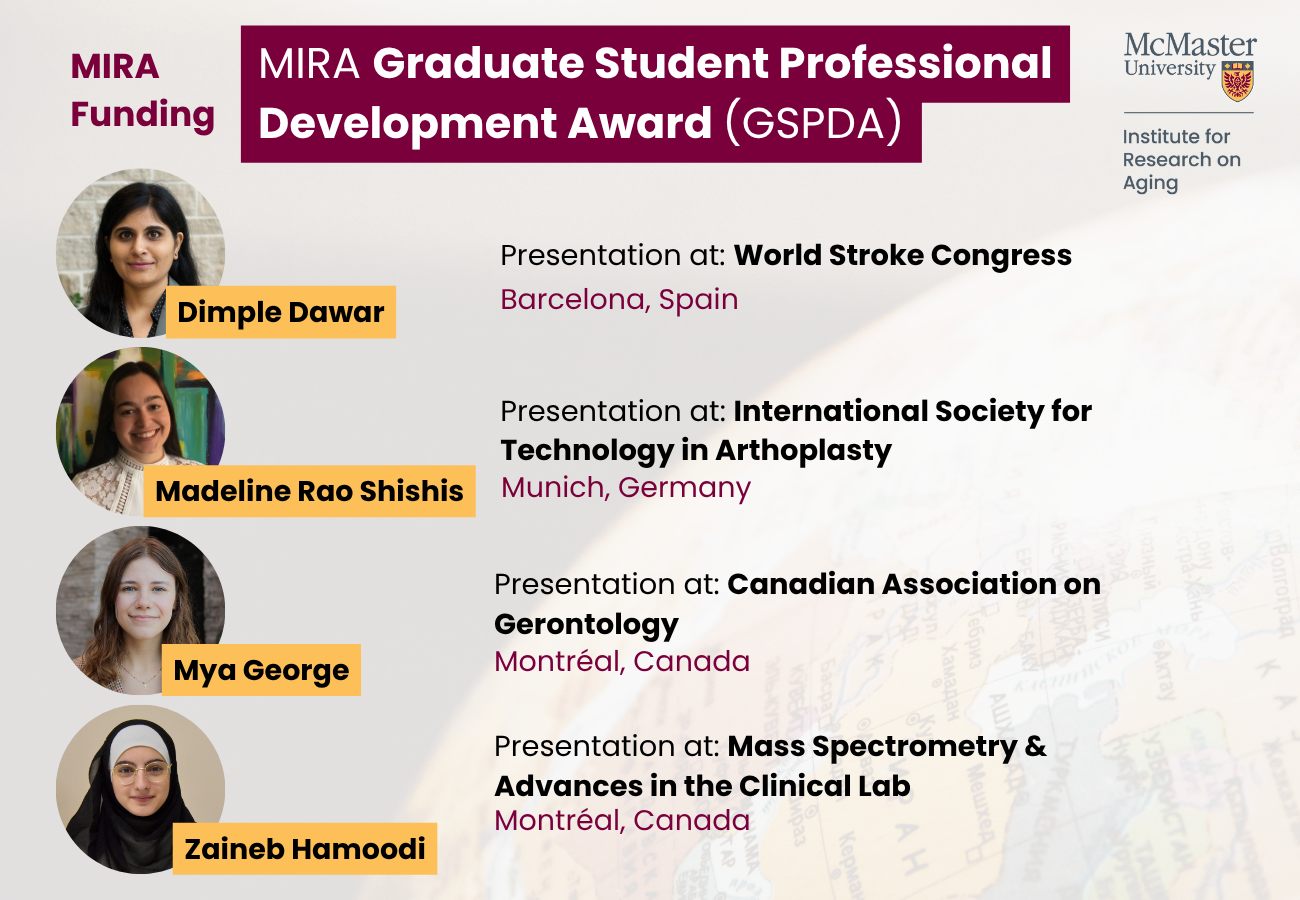The McMaster Institute for Research on Aging (MIRA) funds innovative research that will advance the science of aging and help people age well. Co-developed with university leadership and research stakeholders, MIRA launched two new funding streams in 2021, the MIRA Biology of Aging Catalyst Grant and the MIRA Interdisciplinary Fellowship Grants.
2021 MIRA Biology of Aging Catalyst Grant
MIRA is excited to announce a team led by Dr. Gianni Parise as the inaugural recipients of the MIRA Biology of Aging Catalyst Grant. This $40,000 grant supports aging-related research on the molecular and cellular mechanisms that drive chronic health conditions and diseases associated with aging.
Lifelike 3D cell culture constructs to investigate the role of branched-chain amino acids in type 2 diabetes in aging
Gianni Parise, Kinesiology; Mark Tarnopolsky, Pediatrics & Medicine; Ravi Selvaganapathy, Mechanical Engineering; James McKendry, Kinesiology; Josh Nederveen, Pediatrics; Changhyun Lim, Kinesiology
The funding will allow Dr. Parise’s team to use cell culture experiments to study, in a consistent, reproducible and adaptable manner, the mechanisms that cause disease. Investigators will use a state-of-the-art, three-dimensional cell culture model that can be exercised and fed to simulate normal human muscle.
2021 MIRA Interdisciplinary Fellowship Grants
Through Interdisciplinary Fellowship Grants, MIRA funds projects proposed by teams of MIRA researchers that will bring to McMaster highly qualified postdoctoral fellows to conduct collaborative and interdisciplinary research focused on aging. In 2021, the inaugural year of the program, three grants were awarded.
The digital empowerment of vulnerable senior living: A case study of digital literacy training at CityHousing Hamilton
Brian Detlor, Information Systems; Tara La Rose, Social Work; Carmela Laganse, School of the Arts; Brenda Silverthorne, Collaborator, CityHousing Hamilton; Lisa Weaver Collaborator, Hamilton Public Library
This project with explore digital literacy training to address the gap in digital empowerment of vulnerable older adults living in social housing projects, specifically at CityHousing Hamilton. This project includes a collaboration with the Hamilton Public Library for their digital literacy training resources.
Unraveling the mechanisms contributing to the anti-aging effects of metformin
Gregory Steinberg, Medicine; Vladimir Ljubicic, Kinesiology; Stuart Phillips, Kinesiology; Saman Sadeghi, Chemistry and Chemical Biology; Michael Noseworthy, Electrical and Chemical Engineering; Guillaume Paré, Pathology and Molecular Medicine
The type 2 diabetes medication metformin can delay the start of many age-related diseases in mice and in cross-sectional studies with people. In this project, a mouse model will be used to better understand if and how certain hormones, which metformin increases the production of, may change the anti-aging effects of metformin.
Does exercise enhance synaptic plasticity in individuals with mild cognitive impairment and in aging?
Aimee Nelson, Kinesiology; Margaret Fahnestock, Psychiatry and Behavioural Neurosciences; Ravi Selvaganapathy, Mechanical Engineering; Martin Gibala, Kinesiology; Christopher Patterson, Geriatric Medicine
This study will look at how connections between braincells may be made stronger for people with mild cognitive impairment. Researchers hope to see how exercise, non-invasive brain stimulation and brain-derived neurotrophic factor (a protein that strengthens the connections between nerve cells) may impact healthy aging and memory.

